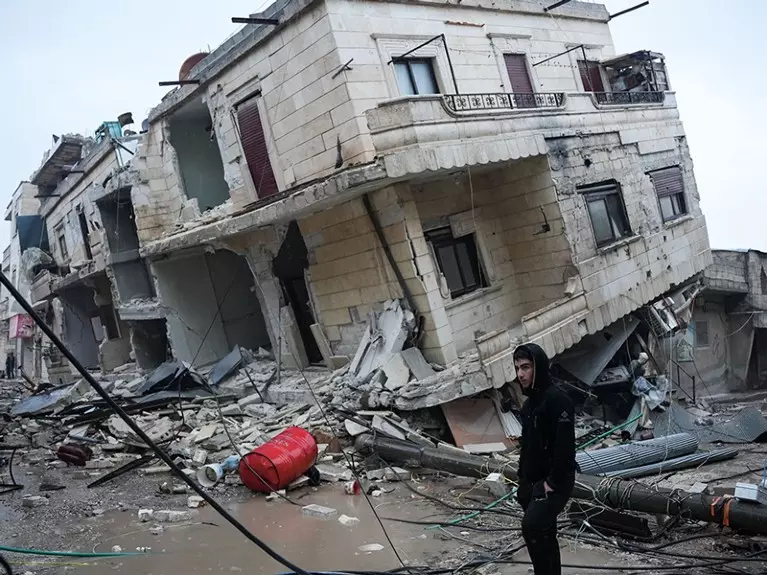
Turkey-Syria quake toll nearing 8,000; searches continue
text_fieldsAnkara/Damascus: As desperate searches continued to find more survivors under the rubble in both Turkey and Syria, the death toll from the devastating 7.8-magnitude earthquake that struck the two nations earlier this week has increased to 7,926, authorities have confirmed.
In an address to the nation early Wednesday, Turkey's Vice President Fuat Oktay said at least 5,894 people have been confirmed dead so far, while 34,810 others were injured, CNN reported.
A total 16,139 teams were currently continuing with the search and rescue operations, with additional international teams to be deployed in the coming days, he added.
In Syria, the death toll has increased to 2,032.
In its latest update, the Syrian Civil Defence, known as the White Helmets, said the number of fatalities in rebel-held areas in northwest Syria stood at 1,220 and the number of injured people rose to 2,600.
Those figures are "expected to rise significantly due to the presence of hundreds of families under the rubble", CNN quoted the group as saying.
"Our teams continue search and rescue operations amid difficult circumstances," it said, describing a tally of more than 400 collapsed buildings, more than 1,300 partially collapsed buildings and thousands of others that were damaged by the early morning quake.
According to Syria's state news agency SANA, at least 812 deaths were confirmed in government-controlled parts of the country.
Extraordinary survival tales have emerged including a newborn baby pulled alive from rubble in Syria, still tied by her umbilical cord to her mother who died in Monday's quake.
More than 60 countries have pledged support and sent humanitarian aid to the affected regions, while there are about 20 international government search and rescue teams on the ground presently.
Freezing weather conditions are further endangering survivors and complicating rescue efforts, as more than 100 aftershocks have struck the region since the initial tremor on Monday.
A winter storm has rendered many roads already damaged by the quake, almost impassable, resulting in traffic jams that stretch for kilometres in some regions.
The cold rain and snow are a risk both for people forced from their homes -- who took refuge in mosques, schools or even bus shelters -- and survivors buried under debris.
"It is now a race against time," said World Health Organization chief Tedros Adhanom Ghebreyesus. "We have activated the WHO network of emergency medical teams to provide essential health care for the injured and most vulnerable," he added.
The devastating 7.8 tremor struck Turkey's southern province of Kahramanmaras at 4.17 a.m. on Monday morning, which was followed by a 6.4-magnitude temblor a few minutes later in Gaziantep province.
The epicentre of the 7.8-magnitude quake was 23 km east of Nurdagi in Gaziantep, at a depth of 24.1 km, according to the US Geological Survey (USGS).
At around 1.30 pm, a third 7.5-magnitude tremor hit Kahramanmaras, which officials said was "not an aftershock".
Turkey's southern province of Hatay and Syria's northern Aleppo city suffered the biggest loss of lives, while Lebanon, Israel and Cyprus also felt the tremor.
Turkish President Recep Tayyip Erdogan declared a three-month state of emergency on Tuesday in 10 of the country's hard-hit provinces.
The latest toll showed 5,434 people killed in Turkey and at least 1,872 in Syria, for a combined total of 7,306 fatalities.
There are fears that the toll will rise inexorably, with WHO officials estimating up to 20,000 may have died.
WHO warned that up to 23 million people could be affected by the massive earthquake and urged nations to rush help to the disaster zone.























